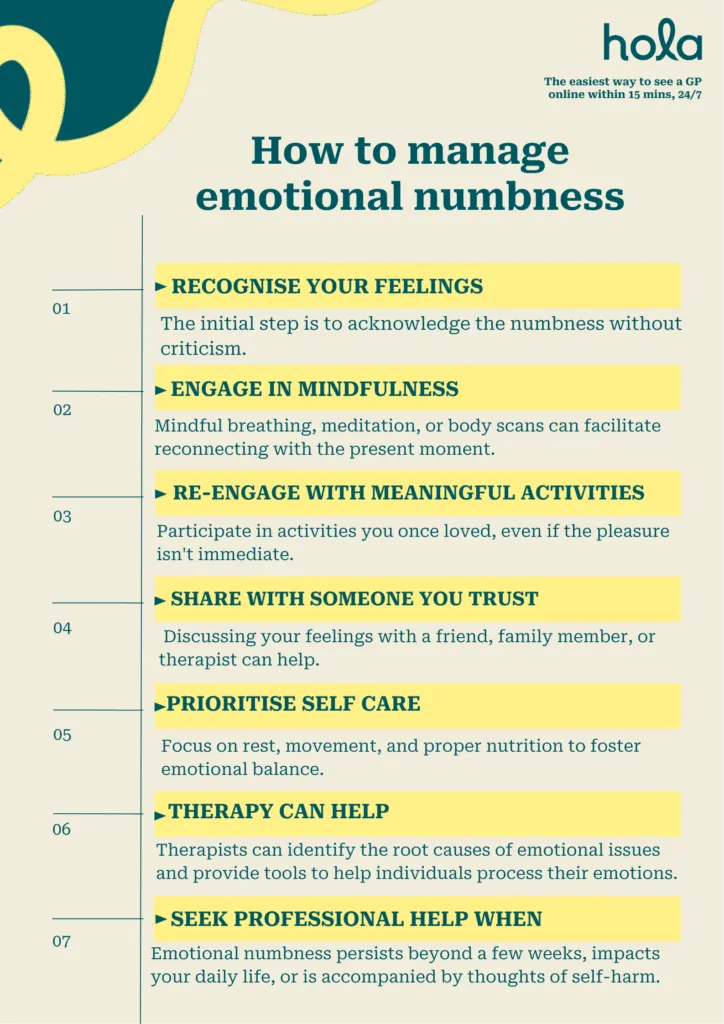What is emotional numbness? How to manage it.
Written by editorial staff writer at Hola. Medically reviewed by Amira Shah, MA in Counselling Psychology, Registered Psychotherapist.

Contents

Summary: Emotional numbness is the feeling of being disconnected from your emotions, often triggered by overwhelm, trauma, or burnout. it is a symptom commonly seen in various conditions like depression, PTSD, and burnout, rather than a standalone diagnosis
Imagine going through your day—smiling, talking, working—but inside, everything feels flat. No highs, no lows, just empty. That’s emotional numbness. It’s your mind’s protective response to stress or overload. But this shutdown isn’t permanent. Let’s explore what’s happening and how to reignite your inner spark.
What is emotional numbness?
Emotional numbness refers to a condition in which an individual feels disconnected from their feelings or is unable to fully experience their emotions. It can feel as if one is emotionally "turned off," where feelings of happiness, sorrow, anger, or love appear distant or muted. Those experiencing emotional numbness frequently describe sensations of emptiness, detachment from others, or a feeling of being on “autopilot.” This state may arise as a reaction to trauma, stress, depression, or burnout, as the mind attempts to shield itself by dulling emotional responses. Although it might seem like a coping mechanism, emotional numbness can impact relationships, decision-making, and overall mental health. It is important to distinguish emotional numbness from dissociation, which involves feeling detached from oneself or reality, though they can sometimes overlap.Signs of emotional numbness
Here are some typical indicators of emotional numbness:- Feeling disconnected from your emotions or uncertain about your feelings
- Losing interest or pleasure in activities that used to bring you joy
- Experiencing feelings of emptiness, blankness, or merely going through the motions
- Having difficulty connecting with others or feeling emotionally distant from those you care about
- Reduced capacity to feel joy, sadness, love, or anger
- Numbness when faced with stressful or emotional situations
- Struggling to express your emotions or feeling emotionally "flat"
- Avoiding situations that may provoke intense feelings
What causes emotional numbness?
Emotional numbness can stem from various psychological, physical, and situational influences.- Psychological factors: Trauma, depression, PTSD, and chronic stress can result in emotional shutdown as a protective strategy.
- Emotional exhaustion: Extended emotional strain from work, caregiving, or personal challenges can lead to feelings of numbness.
- Medications and substances: Certain antidepressants or drugs may suppress feelings as a side effect or as a way to cope. Not everyone experiences this, and any medication changes should always be discussed with a online doctor.
- Unresolved grief or loss: Suppressed grief can obstruct emotional expression, leading to numbness over time.
- Coping mechanism from past abuse: Emotional numbness can develop as a learned survival strategy in response to childhood or relationship trauma.
- Neurological or physical health issues: Conditions like multiple sclerosis or brain injuries can also impact emotional processing.
Ready for positive change? Start your mental health care plan here.
Book an appointment
Fully bulk-billed, across Australia.
How to manage emotional numbness
Though emotional numbness can feel isolating, taking small, deliberate steps can help you reconnect with your emotions and regain balance. Here are some actionable subtopics to assist in the healing journey:- Recognise your feelings: The initial step is to acknowledge the numbness without criticism. Awareness creates an opportunity for emotional reconnection.
- Engage in mindfulness and grounding techniques: Mindful breathing, meditation, or body scans can facilitate reconnecting with the present moment and your inner emotional landscape.
- Re-engage with meaningful activities: Participate in activities you once loved, even if the pleasure isn't immediate. Small efforts can gradually restore emotional sensitivity.
- Share with someone you trust: Discussing your feelings with a friend, family member, or therapist can help alleviate feelings of loneliness and assist in processing blocked emotions.
- Prioritise self-care: Physical wellness contributes to emotional health. Focus on rest, movement, and proper nutrition to foster emotional balance.
- Seek help from professionals: Therapists can identify the root causes of emotional issues and provide tools to help individuals process their emotions, ultimately reducing feelings of numbness over time. If emotional numbness persists beyond a few weeks, severely impacts your daily life, or is accompanied by thoughts of self-harm or hopelessness, it’s important to seek professional help promptly.

When and why to connect with a mental health doctor
If emotional numbness lasts for more than a few weeks, affects your daily living, or interferes significantly with your relationships or work, it’s important to seek professional help. You should also seek help if you find it challenging to perform at work, maintain relationships, or feel emotionally disconnected in situations that should be safe or joyful. If emotional numbness lasts for more than a few weeks, affects your daily living, or you experience worsening symptoms such as difficulty functioning, hopelessness, or thoughts of self-harm, it is critical to seek professional support. A mental health doctor or therapist can help diagnose underlying causes and tailor an effective treatment plan.Conclusion:
Feeling emotionally numb doesn’t mean something’s wrong with you; it’s your brain’s way of taking a break. With compassion, care, and support, you can reconnect. Your feelings are still there; they’re simply waiting for a safe space to return. Keep moving forward, your spark is still within you, just hiding.FAQs
Why do I feel emotionally numb?
Emotional numbness is usually a coping strategy. The brain attempts to protect you from overwhelming stress, trauma, anxiety, burnout, or depression. It can also result from emotional saturation or years of bottling up feelings. While it may feel unsettling or difficult, it’s your system signalling, “ I need a break,” not a flaw in you. It’s important to understand this response as temporary and treatable.How do I know if I’m emotionally numb?
You might be emotionally numb if you feel disconnected from your feelings, struggle to experience happiness or sorrow, or have a constant sense of emptiness. Life can feel mechanical, as if you are existing without engaging. You may also feel disconnected from others or turn to distractions like scrolling or overworking to avoid discomfort. Other signs include difficulty expressing emotions or feeling emotionally “flat.”Can emotional numbness be a sign of depression?
Yes, emotional numbness is a common symptom of depression. Rather than feeling sad, some people experience a sense of emptiness, emotional detachment, or loss of interest in things that once mattered. If this sounds familiar, consider speaking to a therapist or a counsellor. Emotional numbness can also co-occur with anxiety and PTSD.How can I manage emotional numbness?
Here are some ways to reconnect with your emotions:- Practice mindfulness
- Exercise regularly
- Maintain a journal
- Listen to music or engage in a hobby
- Be patient
- Reduce screen time
- Talk to a friend or therapist for support
Is emotional numbness a normal response to stress?
Yes, emotional numbness can be a normal, temporary response to chronic stress. It’s your brain's way of shielding you from emotional overload. However, if this disconnection lingers or interferes with your daily functioning, it’s important to recognise that your emotional well-being needs attention. Reaching out to a mental health expert can be beneficial. Long-term numbness warrants professional support.How can therapy help with emotional numbness?
Therapy provides a secure space to examine the root cause of emotional numbness, such as past traumas, persistent stress, or repressed emotions. Through the process, you can learn to reconnect with your inner world, build healthier ways to cope, and strengthen your emotional resilience. It’s like having a steady hand as you rediscover your emotions. Therapies such as EMDR, CBT, or mindfulness-based approaches can be particularly effective.Can emotional numbness be permanent?
Emotional numbness may seem never-ending, but it’s rarely permanent. It’s often a protective response to stress, trauma, or emotional strain. With gentle support, therapeutic guidance, and intentional self-care, healing is achievable. Recovery timelines vary but most people improve with consistent effort and support.When should I seek professional help for emotional numbness?
You should consider seeking professional help if emotional numbness lasts for more than a few weeks, affects your personal life, work, and daily routine, or is accompanied by other symptoms like anxiety, low mood, or constant fatigue. If you feel lost or unsure about the way you feel, a therapist can help you understand the root cause and guide you through the healing process. Early intervention can prevent worsening symptoms and support faster recovery.Take control of your mental health. Begin your care plan now.
Book an appointment
Fully bulk-billed, across Australia.
What we treat
- Cough
- Nausea & vomiting
- Fever
- Hayfever
- Fatigue
- Sore throat
- Acne
- Hair loss
- Gout
- Eczema
- Rosacea
- Sunburn
- UTI
- Erectile dysfunction
- Contraception
- Morning sickness
- Morning after pill
- Prostate health
- Anxiety
- Depression
- Stress
- Grief & loss
- Antidepressants
- Premature ejaculation
- Asthma
- Blood pressure
- Blood thinners
- Diabetes
- Cholesterol
- Migraines & headaches
- Allergies
- Body ache
- Heartburn & reflux
- Sleep disorder
- Pain relief
- Gastro
Related Articles
What To Say To Doctor To Get Stress Leave Australia?
January 29, 2026Mental Health
What To Say To Doctor To Get Stress Leave Australia? Written by Priyanka Agarwal, Writer...
Disclaimer
This blog is for general informational purposes only and does not indicate that Hola Health provides all treatments or preventive measures mentioned. It is not intended to be a substitute for professional medical advice. Always seek the guidance of your doctor or other qualified health professional with any questions you may have regarding your health or a medical condition. For emergencies please immediately contact 000. Any medical topics discussed are intended to educate, not to imply availability through Hola Health.
 Facebook
Facebook  X
X  Copy Link
Copy Link



